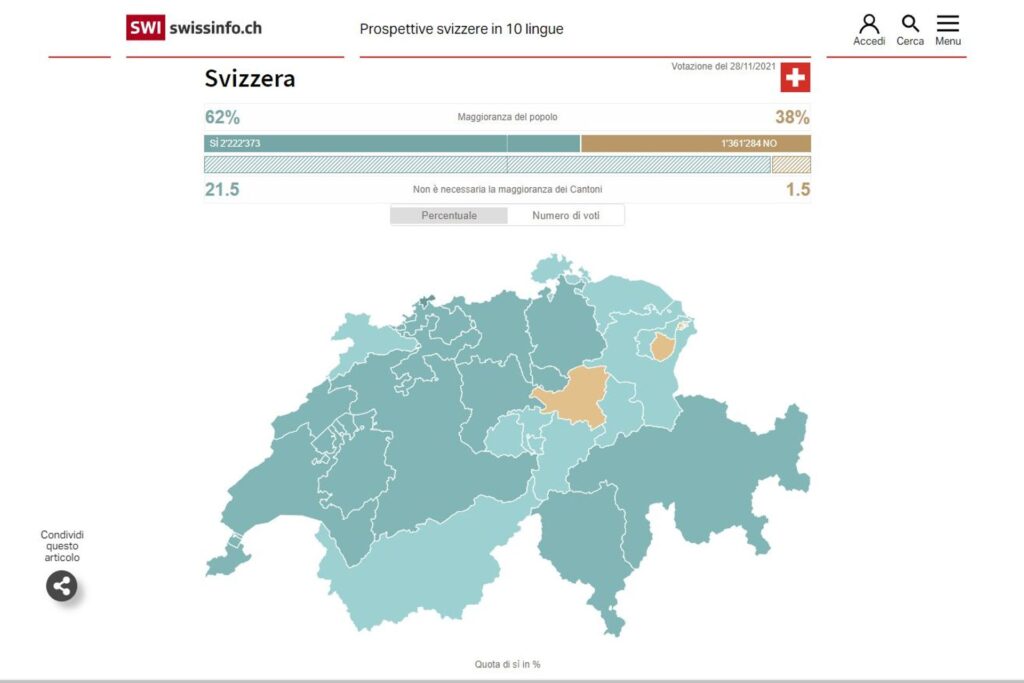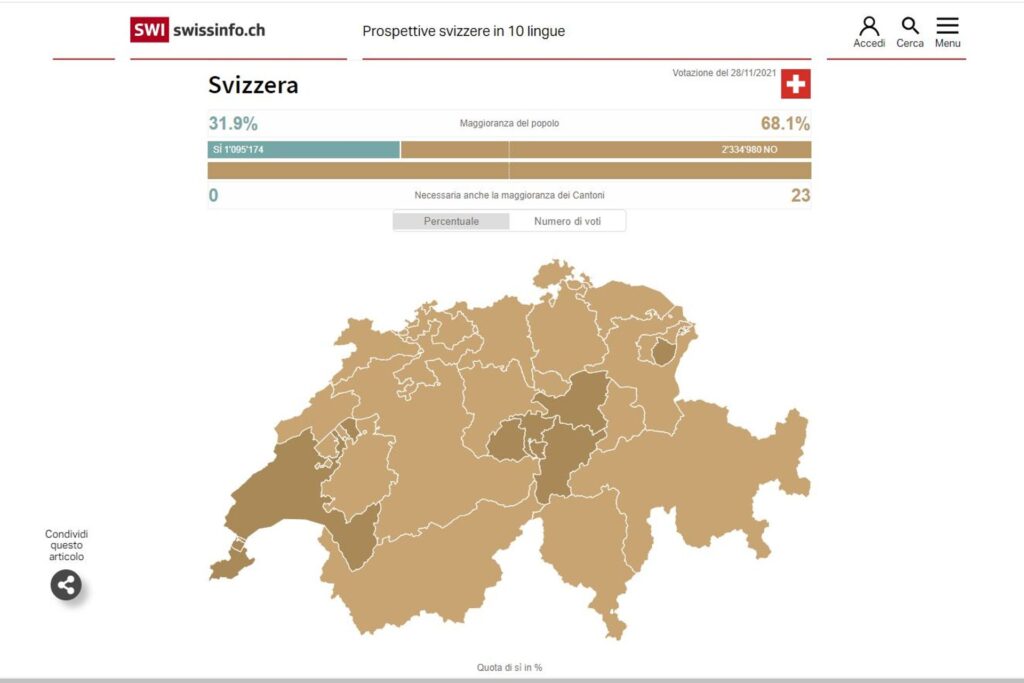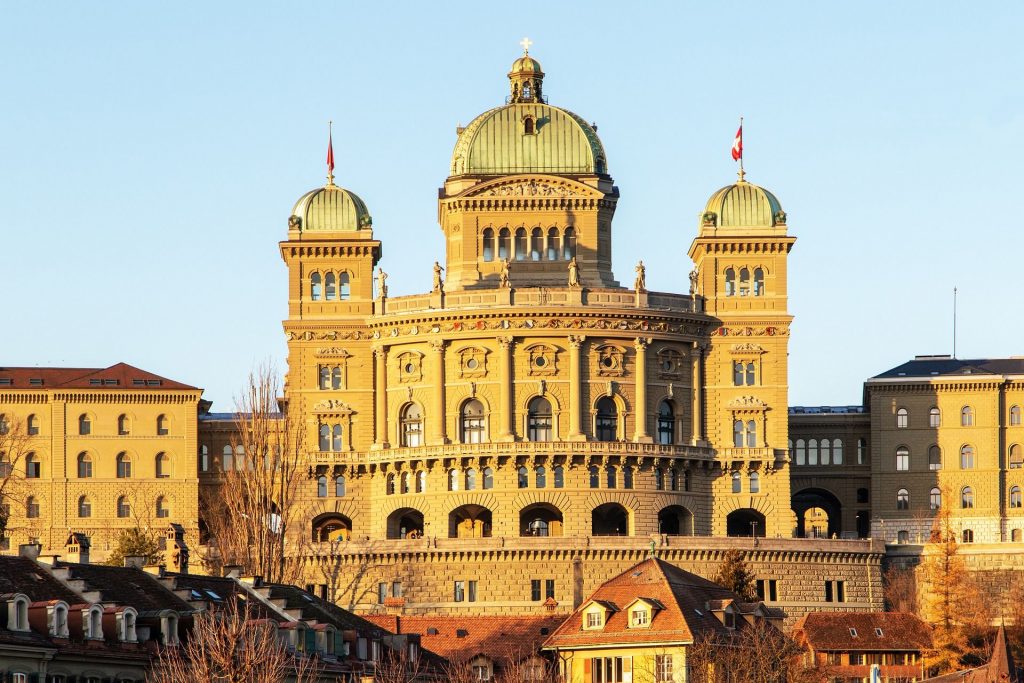The “new” COVID19 law passes the Swiss people’s scrutiny
On 11/28 approved two health care measures (Federal Council policy and support for nurses) and rejected the judges’ draw
Two confirmations, one rejection. This is the balance of the last round of popular vote in Switzerland in 2021, with referendums that had as their object the amendments of March 19 to the law of management to the epidemic of Coronavirus, an initiative to support the work of nurses and, finally, a hypothesis of drawing lots instead of political appointment of federal judges.
The COVID certificate passed the ballot box test unimpeded with 62 percent support. The anti-coronavirus measures, which were hotly contested in the streets of the Confederation, are therefore still supported by the majority.
It was not only the COVID Pass that was under scrutiny, but also the extension of financial aid and infection tracing included in the March amendment of the legislation, which had already been approved in its original version on June 13 by 60.2% of the Swiss electorate and only rejected in a few cantons of Central and Eastern Switzerland.
Only two states have rejected the modified law of March 19: Appenzell Innerrhoden, where the favorable opinions did not exceed 44.2%, and Schwyz, with 51.4% of the votes against.
The champion of the “yes” vote was Basel-Stadt (70.6%), ahead of Ticino with 65.3% of the votes. In Graubünden, another border territory, the COVID-19 law was approved by 60.9% of Swiss citizens, while Appenzell Ausserrhoden was the most uncertain with 50.7%.
Switzerland and the “fantastic four” of direct democracy
The ethics of competitiveness and the spirit of federalism
Waldstätte and the “forest” cantons at the dawn of Swiss…

This was a vote that had inflamed the spirits of the entire Swiss nation, as recalled by the very high turnout (about 65%), the fourth highest since 1971, when women were granted the right to vote at the federal level.
In the German-speaking cantons, the “yes” votes increased by about 4 percentage points, explained Lukas Golder, co-director of gfs.bern. “In particularly critical cantons, where there are especially many unvaccinated people, more individuals voted ‘yes’ than in June.” In Romandie and French-speaking areas, however, the opposite happened, i.e., skepticism grew.
Regula Rytz (Greens), the National Councillor who has manifested a position not dissimilar to that of the Swiss Union of Entrepreneurs (USI) and the Swiss Union of Trade Unions (USS) and who lives in Bern, invited those who oppose the COVID-19 law to accept the result of the referendum, speaking to “20 Minuten”.
In contrast, the movement “Mass-Voll, which was at the forefront of demonstrations against the restrictive anti-pandemic measures, did not accept the result of the vote at all.
“In light of the massive irregularities, which in this entity have no example in recent history, we consider the outcome of the vote not legitimate and not binding for us,” they spread via Twitter.
The three topics up for a vote in Switzerland on November 28, 2021
COVID certificate ordinance adopted in Switzerland

The COVID certificate of the Swiss Confederation in digital version
Clear yes to the initiative “For strong nursing care”
The call of Swiss health care professionals to protect their professionalism has been accepted by the people, who on Sunday, November 28 accepted the initiative “For strong nursing care” with 61 percent of the votes.
As is well known, nurses are and have been very involved in the fight against the Coronavirus epidemic, which has affected the whole world. Applauded from balconies during confinement in the spring of 2020, they have long demanded concrete actions to address the nursing shortage in Switzerland.
With the exception of Appenzell Innerrhoden, support was unanimous everywhere. The text of the initiative thus passed the double majority test (of the people and the cantons), a prerequisite for the acceptance of a popular proposal.
The Presidency of the Swiss Confederation from 1848 to today
Swiss monuments? A “hidden” treasure to be enhanced…
Athenian democracy? Revive between Glarus and Appenzell…

This is one of the initiatives with the highest support since the introduction of this instrument of democracy in 1891, especially since the turnout was particularly high (at 65%): it is also the first time in the last forty years that an initiative supported by trade unions is accepted by the electorate.
“It’s a historic day!” commented Sophie Ley, president of the Swiss Association of Nurses and Nurse Practitioners (ASI). “The population shares the values defended by the initiative, even if the politicians did not want to listen to them,” she said in an interview with Radio Télévision Suisse.
In contrast, the Swiss population “followed their hearts,” said Isabelle Moret, leader of the Association of Swiss Hospitals H+, which opposed the initiative. “With today’s result, the people have shown their support for the staff in the hospitals, even if it means an increase in health costs and therefore in basic health insurance premiums,” she said.
The three topics up for a vote in Switzerland on Nov. 28, 2021
Stages and members of the Care Quality Commission

And the “Justice Initiative” fails to win over the voters
68.1% of the Swiss electorate rejected the proposal “For the appointment of federal judges by lot”, which was not successful in any canton.
The text proposed that the office of federal judge be assigned by drawing lots from a list of persons considered suitable for the profession and drawn up by an expert commission appointed by the government.
The initiative also provided that the term of office would no longer have a precise duration, but would expire five years after the normal retirement age. Only in the event of serious violations of official duties or illness would it be possible for the federal judge to be dismissed by Parliament.
Known as the “Initiative on Justice”, it was promoted by a committee of citizens led by the wealthy businessman Adrian Gasser, owner of the Lorze Group in Zug.
The committee argued that a “qualified draw” would be the best way to “depoliticize” the election of federal judges. Currently, the Swiss Parliament allocates offices with a view to ensuring that political forces are equally represented: this implies that candidates are members of a party.
The Europe of the small States and a barely sketched federalism…
The brochure “The Confederation in Brief” 2021 is now available for download
The “von Wattenwyl Talks” and the search for a compromise

The “yes” camp also challenged the so-called “mandate fee” paid by magistrates to their party, which has no equal in the world. In exchange for this fee, he can count on the support of the political movement during re-election.
These concerns are also shared by the Group of States against Corruption (GRECO) of the Council of Europe, which has reprimanded Bern for a system deemed somewhat risky.
“The Swiss people have confidence in the independence of the judiciary and do not want experiments,” commented Karin Keller-Sutter, head of the Federal Department of Justice. “The current system is not perfect, and discussions will continue to improve it,” she added after the results of the vote were published.
“This has sabotaged the formation of opinion,” said Zürich initiativist Adrian Gasser. “The state and the political parties did not want to inform the population,” he added by way of a reaction, saying he was convinced that “in two or three years” he would be able to raise people’s awareness.
The three topics to be voted in Switzerland on November 28, 2021
Michael Schöll in charge of the Federal Office of Justice







